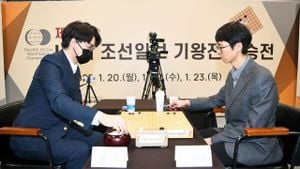South Korean prosecutors are currently delving deep behind the scenes of the nation’s political framework, focusing on alleged illegal campaign financing tied to various entities, including high-profile figures such as President Yoon Suk-yeol. This comprehensive investigation is raising eyebrows not only for its potential to alter the political climate but also for the questions of integrity it poses for parties involved.
The nation is at a pivotal moment as the prosecutors explore claims of financial misconduct during election campaigns. Reports indicate these allegations are stemming from irregularities observed within the funding structures of several political movements and their engagements. According to the Korea Herald, the investigations aim to highlight the serious ramifications of any found improprieties, with the stated goal of maintaining the integrity of South Korean electoral processes.
President Yoon Suk-yeol stands at the center of these inquiries, particularly concerning his administration's financial activities. The public has expressed concern over the transparency of political financing, with many citizens yearning for accountability from their leaders. "The investigations are serious and aim to uphold integrity within the political processes of our nation," exclaimed one official from the investigative team, who requested to remain anonymous due to the sensitivity of the case.
Leading the charge, prosecutors have deployed diverse methodologies to collect evidence and testimonies, hoping to piece together the framework of these financial transactions. Interviews with key witnesses and examination of financial records have already commenced, according to the spokesperson from the South Korean Prosecutor's Office, who noted, "We're committed to maintaining transparency and accountability among all political entities involved." The path of this investigation could redefine the approach to campaign financing within South Korea.
Critics argue this is not just about illegal transactions; it reflects broader issues about political ethics and public trust. The ramifications of their findings may well stretch far beyond the immediate suspects, possibly reshaping the future of political operations altogether. Citizens have taken to social media expressing their views, with many calling for stricter regulations around campaign financing to prevent any similar occurrences.
It is evident how pivotal this investigation could become, serving both as a direct response to existing societal concerns about political finance and as a potential catalyst for reform. Observers are eager to see how these proceedings will influence voter attitudes and expectations from their elected officials.
While the investigation is still poised to unravel more complex leads, the focus remains tightly connected to ensuring public officials adhere to established ethical standards. For South Koreans, the outcome of this inquiry could mark significant progress or result in heated debates about the future of political decorum.
Indeed, the investigation's progress and any conclusions drawn from it are likely to dominate headlines and discussions for the near future. The importance of transparency and the urgency of accountability are clear goals for both the investigators and the citizens awaiting clarity on the integrity of their political system.
With the stakes so high, South Korean prosecutors are pressing forward, determined to piece together the puzzle of alleged illegal financing and bring to light the truths hidden within the shadows of political engagement. This investigation serves as both warning and examination of the nature of party politics within South Korea—calling for transparency and accountability where it may have been overlooked.



